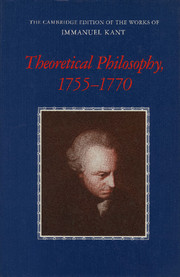Book contents
- Frontmatter
- Contents
- General editors' preface
- Preface
- Guide to abbreviations
- General introduction
- Introductions to the translations
- Résumés of the works
- A NEW ELUCIDATION OF THE FIRST PRINCIPLES OF METAPHYSICAL COGNITION (1755)
- THE EMPLOYMENT IN NATURAL PHILOSOPHY OF METAPHYSICS COMBINED WITH GEOMETRY, OF WHICH SAMPLE I CONTAINS THE PHYSICAL MONADOLOGY (1756)
- AN ATTEMPT AT SOME REFLECTIONS ON OPTIMISM (1759)
- THE FALSE SUBTLETY OF THE FOUR SYLLOGISTIC FIGURES (1762)
- THE ONLY POSSIBLE ARGUMENT IN SUPPORT OF A DEMONSTRATION OF THE EXISTENCE OF GOD (1763)
- ATTEMPT TO INTRODUCE THE CONCEPT OF NEGATIVE MAGNITUDES INTO PHILOSOPHY (1763)
- INQUIRY CONCERNING THE DISTINCTNESS OF THE PRINCIPLES OF NATURAL THEOLOGY AND MORALITY (1764)
- Introduction
- First reflection General comparison of the manner in which certainty is attained in mathematical cognition with the manner in which certainty is attained in philosophical cognition
- Second reflection The only method for attaining the highest possible degree of certainty in metaphysics
- Third reflection On the nature of metaphysical certainty
- Fourth reflection Concerning the distinctness and certainty of which the fundamental principles of natural theology and morality are capable
- Appendix Abridgement of Moses Mendelssohn's prize-winning essay
- M. IMMANUEL KANT'S ANNOUNCEMENT OF THE PROGRAMME OF HIS LECTURES FOR THE WINTER SEMESTER 1765 — 1766 (1765)
- DREAMS OF A SPIRIT-SEER ELUCIDATED BY DREAMS OF METAPHYSICS (1766)
- CONCERNING THE ULTIMATE GROUND OF THE DIFFERENTIATION OF DIRECTIONS IN SPACE (1768)
- ON THE FORM AND PRINCIPLES OF THE SENSIBLE AND THE INTELLIGIBLE WORLD [INAUGURAL DISSERTATION] (1770)
- Factual notes
- Bibliographies of editions and translations
- Glossary
- Biographical-bibliographical sketches of persons mentioned by Kant
- Index
Second reflection - The only method for attaining the highest possible degree of certainty in metaphysics
Published online by Cambridge University Press: 18 December 2014
- Frontmatter
- Contents
- General editors' preface
- Preface
- Guide to abbreviations
- General introduction
- Introductions to the translations
- Résumés of the works
- A NEW ELUCIDATION OF THE FIRST PRINCIPLES OF METAPHYSICAL COGNITION (1755)
- THE EMPLOYMENT IN NATURAL PHILOSOPHY OF METAPHYSICS COMBINED WITH GEOMETRY, OF WHICH SAMPLE I CONTAINS THE PHYSICAL MONADOLOGY (1756)
- AN ATTEMPT AT SOME REFLECTIONS ON OPTIMISM (1759)
- THE FALSE SUBTLETY OF THE FOUR SYLLOGISTIC FIGURES (1762)
- THE ONLY POSSIBLE ARGUMENT IN SUPPORT OF A DEMONSTRATION OF THE EXISTENCE OF GOD (1763)
- ATTEMPT TO INTRODUCE THE CONCEPT OF NEGATIVE MAGNITUDES INTO PHILOSOPHY (1763)
- INQUIRY CONCERNING THE DISTINCTNESS OF THE PRINCIPLES OF NATURAL THEOLOGY AND MORALITY (1764)
- Introduction
- First reflection General comparison of the manner in which certainty is attained in mathematical cognition with the manner in which certainty is attained in philosophical cognition
- Second reflection The only method for attaining the highest possible degree of certainty in metaphysics
- Third reflection On the nature of metaphysical certainty
- Fourth reflection Concerning the distinctness and certainty of which the fundamental principles of natural theology and morality are capable
- Appendix Abridgement of Moses Mendelssohn's prize-winning essay
- M. IMMANUEL KANT'S ANNOUNCEMENT OF THE PROGRAMME OF HIS LECTURES FOR THE WINTER SEMESTER 1765 — 1766 (1765)
- DREAMS OF A SPIRIT-SEER ELUCIDATED BY DREAMS OF METAPHYSICS (1766)
- CONCERNING THE ULTIMATE GROUND OF THE DIFFERENTIATION OF DIRECTIONS IN SPACE (1768)
- ON THE FORM AND PRINCIPLES OF THE SENSIBLE AND THE INTELLIGIBLE WORLD [INAUGURAL DISSERTATION] (1770)
- Factual notes
- Bibliographies of editions and translations
- Glossary
- Biographical-bibliographical sketches of persons mentioned by Kant
- Index
Summary
Metaphysics is nothing other than the philosophy of the fundamental principles of our cognition. Accordingly, what was established in the preceding reflection about mathematical cognition in comparison with philosophy will also apply to metaphysics. We have seen that the differences which are to be found between cognition in mathematics and cognition in philosophy are substantial and essential. And in this connection, one can say with Bishop Warburton that nothing has been more damaging to philosophy than mathematics, and in particular the imitation of its method in contexts where it cannot possibly be employed. The application of the mathematical method in those parts of philosophy involving cognition of magnitudes is something quite different, and its utility is immeasurable.
In mathematics I begin with the definition of my object, for example, of a triangle, or a circle, or whatever. In metaphysics I may never begin with a definition. Far from being the first thing I know about the object, the definition is nearly always the last thing I come to know. In mathematics, namely, I have no concept of my object at all until it is furnished by the definition. In metaphysics I have a concept which is already given to me, although it is a confused one. My task is to search for the distinct, complete and determinate concept. How then am I to begin? Augustine said: ‘I know perfectly well what time is, but if someone asks me what it is I do not know.’ In such a case as this, many operations have to be performed in unfolding obscure ideas, in comparing them with each other, in subordinating them to each other and in limiting them by each other. And I would go as far as to say that, although much that is true and much that is penetrating has been said about time, nonetheless no real definition has ever been given of time.
Information
- Type
- Chapter
- Information
- Theoretical Philosophy, 1755–1770 , pp. 256 - 263Publisher: Cambridge University PressPrint publication year: 1992
